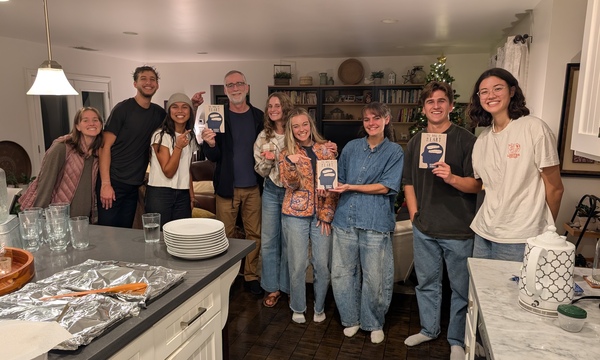As a parent of three kids, I am frequently trying to help them best navigate cultural voices vying for their hearts and minds. This is why I am thrilled about the new book, A Practical Guide to Culture: Helping the Next Generation Navigate Today’s World, by Brett Kunkle and John Stonestreet. They are both my good friends and ministry partners. But most importantly, they have written an excellent book.
If you work with students in any capacity—parent, youth worker, teacher, mentor—this is a book you need to get. Read it, study it, and pass it on to other youth influencers. Here's a quick interview to give you a taste of how to help students best navigate culture:
SEAN MCDOWELL: Why did you feel the need to write a book helping the next generation navigate culture?
KUNKLE & STONESTREET: There are nine reasons we wrote this book: Alexis, Micah, Paige, Ella, Jonah, Abigail, Ann, Ali and Hunter. They are our kids, from 22 years old all the way down to 2 months old, and we’re in the middle of trying to help them navigate the challenges of this cultural moment. We speak to parents all the time who sense, like us, that the tides have shifted significantly.
We’ve watched as the culture has become saturated with explicit sexuality, omnipresent glowing screens, increasing racial tension, marketing messages promising the good life, information from a thousand different voices, and the celebration of perpetual adolescence. However, kids growing up in this culture have never known anything different. If they are going to be discipled in Christ within the context of these challenges, we must be intentional in some very specific areas and some very key ways.
Also, we wanted to provide a resource that was tremendously practical, as the title of the book says. There are many good academic and theoretical treatments of culture that have been written recently, and we wanted build on that work and leverage the insights of those books to help parents, teachers, and mentors of the next generation apply these insights in ways that will equip the next generation to thrive as followers of Christ.
What is culture? And are Christians in, above, or against culture?
To answer the second question first, yes! With proper discernment and grounding in the overarching story of redemption that Scripture provides, we will find ourselves at various times in culture, while holding to truths and values and practices that are above culture, but will occasionally (and in some contexts, often) find ourselves against culture. We see all three approaches at different times throughout the history of the Christian church. In this Practical Guide, we hope to help the next generation cultivate the wisdom to know which approach will be required in various arenas of culture today.
Defining culture, which is how we begin the book, is essential for developing that discernment. Many Christians reduce culture to all the bad stuff “out there.” On this view, our posture will constantly be against anything and everything in culture. However, this view fails to recognize that you find culture wherever you find human beings, so we cannot reduce it to the stuff “out there.” Culture is simply what humans make of the world. It includes all of our ideas, institutions, habits, and the structures we embrace to live life together.
God made us to be culture creators. Thus, culture in and of itself is not what is bad. Instead, it’s the worldview underneath our culture-building that is true or false and it’s the direction we take culture which may be good or evil, life-giving or dehumanizing.
How does the ubiquity of information shape the way kids think? And what are a couple practical ways to counter this?
Those of us living today will encounter more information daily than someone living just a few centuries ago would have encountered during the entire course of their life. Ours is the age of information and we must understand that information constantly communicates ideas about how we are to think about and live in this world. Ideas are not merely confined to the theoretical realm but ultimately, ideas have consequences for all of life. And bad ideas have victims.
In this age, access to information has replaced the pursuit of wisdom. So, without a keenly developed sense of discernment, kids may have all the information in the world at their fingertips and yet, not know how to live life well, with wisdom. Additionally, technology has “flattened” the world such that it is more difficult than ever to distinguish between what is an authoritative source and what isn’t. For our kids, this creates a major existential struggle as they ask, “Who should I trust?” In a world with so many voices, should they listen to mom and dad, their pastor, their teachers, their friends … or Wikipedia? Often, the inability to discern truth from error among all these different sources can lead to skepticism and cynicism about truth itself.
Thus, discernment is a skill we must help our kids develop. Practically, in the book we suggest that parents, mentors, and teachers should learn from the greatest educator in history, Jesus. Jesus was much more than a teacher, of course, but as He taught He harnessed the power of asking good questions. Often, His response to a question was a another question, in order to expose faulty assumptions, reveal truth and develop discernment in His listeners. In this book we offer a number of discernment-building questions to use with students to cultivate wisdom and discernment.
Perhaps the most important question students should be asked and taught to ask is, “What do you mean by that?” This important question can bring much-needed clarity amidst all the information out there. For instance, we often find ourselves using the same words as others in our culture, but not meaning the same thing. When it comes to words like love, truth, freedom, God, gender, and purpose, the Christian’s dictionary will be very different than the culture’s dictionary. When we equip students with good questions, we help them find clarity in the language and ideas of the culture. Next, we then teach them how to employ those questions when they are watching a movie on Netflix, listening to their college professor, or having a conversation with their Muslim friend.
What do you think is the most pressing issue youth influencers need to address?
It’s difficult to identify a single issue as the most pressing issue of our day. In the book, we distinguish between two kinds of pressing issues. First, there are the more visible and obvious cultural challenges (what we call the “cultural waves”) and second, there are the less-than-obvious cultural shifts (the “cultural undercurrents”) we face in this moment.
One of the most pressing cultural “waves” is pornography, because of the chaos and devastation it can bring into our lives. Porn can create life-long addiction, it devalues others, especially women, and it will harm relationships, particularly the most important human relationships of spouses and children. On a worldview level, we offer strategies to teach students how pornography corrupts the God-given gift of sex, which is a very good gift. On a practical level, we offer ways in which we can best communicate with students about porn, as well as how to establish boundaries and protections to limit its influence in our homes.
One of the most pressing “undercurrents” facing students is our culture’s understanding of identity. Older generations are tempted to see cultural challenges, especially those having to do with sexuality, as primarily moral issues. And certainly, they are moral issues, but underneath the moral shifts in the sexual views of our culture is the issue of identity. The culture now sees and celebrates sexuality as an identity. However, this weak, shriveled-up view of human dignity stands in stark contrast to the truth, goodness and beauty of the Christian worldview. Not only should we help students understand how to behave, but they need to know who they are as image bearers of their Creator.
You have a chapter on affluence and consumerism. Worldview books often ignore this topic. Why did you include it, and what do youth leaders need to know about it?
Blaise Pascal said there is a God-shaped hole in our hearts that only He can fill. Today, we are bombarded with thousands of marketing messages telling us that hole in our hearts is actually “stuff-shaped,” and the answer is to fill it up with wealth, consumer goods, and pleasure. In this context, our kids live and move and have their being. Think about commercials. Rarely sell us products anymore. Instead, they sell meaning, purpose, and salvation. They promise that the right clothes, cars and consumer goods will deliver to us the good life. Therefore, we find ourselves worshipping stuff at our modern-day temples (also known as the mall) or at the Amazon.com Cathedral, as if acquiring and consuming will meet our deepest needs.
What we worship becomes our highest good, so along the way, a materialistic culture begins to value stuff more than people and ultimately, more than God. Christians are not immune to the culture’s consumer impulses, viewing church as a consumer experience that exists primarily to meet our needs. If it doesn’t, we go church shopping and look for a more pleasurable worship experience elsewhere. In the process, many students drift away from church because it cannot compete on the level of consumerism with what the culture offers.
Our kids need two antidotes to the consumerism of the culture: worship and service. Only God can fulfill our deepest desires, so we must help our students trade-in the worship of stuff for the worship of God. But proper worship requires proper theology, so teaching our kids who God is and what He has done is vital. Discipleship that includes worldview is well-equipped to do this. Additionally, students must trade-in their selfish acts of acquisition for selfless acts of service. In doing so, they will learn to love God by loving their neighbor, and will begin to replace a consumeristic posture toward life with a posture of service and humility. And Jesus words will take on new meaning: “whoever wants to save their life will lose it, but whoever loses their life for me will save it. What good is it for someone to gain the whole world, and yet lose or forfeit their very self?” (Luke 9:24-25)
You can find the original version of this article on Sean McDowell's blog.
 Biola University
Biola University



